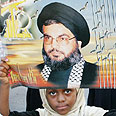
Lebanon lying in wait
Christians, Sunnis, some Shiites have tough questions for Nasrallah. But even if they don’t rush to call him 'defender of Lebanon' again, Hizbullah remains influential element in Lebanese politics, does not rush to silence its guns. Will it be able to present proof of victory? And how will Land of Cedars look on day after? Experts talk
"Hizbullah has become weak on a few important parameters," elaborates Dr. Reuven Erlich, an expert on Lebanon. "First, the stronghold it built in the past six years, which became one of its symbols of power, has been harshly beaten. There may be some resistance, but it is clear that what it built will not return to the previous format."
"Second, the 'security quadrangular' area in Beirut's Dahiya, where all the main headquarters were concentrated and which the Lebanese government did not have access to, has been largely destroyed.
"Third, the missile arsenal has been greatly damaged, even if it has not been completely destroyed. In addition, the organization has hundreds of casualties among its core group of its best fighters.
"So it is clear that its operational and political status has been damaged, at least for now. The refugees who will return to the south will also see massive wreckage and will ask tough questions."
However, alongside all these blows, it is clear that Hassan Nasrallh does not plan to surrender, and he will do all he can, with the help of his operators in Tehran, to quickly rehabilitate the organization.
"In spite of everything, Hizbullah's main nucleus – headed by Nasrallah – has not been damages. He continues to operate, and the aid from Iran and Syria is definitely expected to continue and even become stronger," said Dr. Erlich, head of the Intelligence and Terrorism Information Center.
What will the political map in Lebanon look like on the day after? On the onset of the fighting, heads of the anti-Syrian bloc came out strongly against Nasrallah with harsh and direct remarks.
"We will obtain revenge against those who got Lebanon entangled," Saad Hariri said fearlessly, while Lebanese Druze leader Walid Jumblatt accused Hizbullah of working for Iranian and Syrian interests, and not in the favor of Lebanon.
"The Druze, the Sunni Muslims, some of the Maronite Christians, and maybe even some of the Shiites are lying in wait for Nasrallah," explained Prof. Eyal Zisser, an expert on Syria and Lebanon. "There is no doubt that they will hurl accusations at him for wreaking havoc in Lebanon, and there is no doubt that the issue of Hizbullah's weapons will be raised."
"But nonetheless, it still seems that there is no one who can disarm Hizbullah apart from Nasrallah himself. And southern Lebanon is the organization's 'home.' It is reasonable to assume that it will do everything to rehabilitate and arm itself," he added.
Different sources in Israel sounded more optimistic.
"A very positive process has been created here as far as Israel is concerned, a lot more positive than what we knew in the past," they said, referring to the fact that Nasrallah was forced to "fall hook, line and sinker" and allow the deployment of the Lebanese army and a reinforced UNIFIL force in the "Hizbullah land."
However, "this is a long process and not a video game. We will have to wait several months to see how things develop."
So who won?
The first test on the way to stabilizing the region will be in the enforcement of the ceasefire in the coming days. Nasrallah promised that as long as Israel Defense Forces soldiers are on Lebanese territory, they would be attacked by his people.
Israeli officials made it clear that in any case, fire would be answered with fire. But northern communities may possibly be relieved.
"It is definitely reasonable to assume that Nasrallah will not launch Katyushas at Israel, if it should not attack in Lebanon. He is interested in taking advantage of the ceasefire in order to emerge from the fighting and rehabilitate," Prof. Zisser estimated.
And what about a full implementation of Resolution 1701? Here the picture is already more complex.
"A through examination of all the agreements in Lebanon in the past 30 years show that every decision and agreement okayed at the Security Council has either been partillay implemented or not at all," Dr. Erlich noted.
"An important factor will the extent to which Israel insist on implementing the agreements and maintaining them. When it withdrew from Lebanon in 2000, we declared that we will respond harshly to any violation, and we have not done so until now. Experience shows that if Israel fails to retaliate – the redemption will arrive, big time.
"We can also clearly see that the different terror organizations had an extraordinary survival ability, so from the outset it was unreasonable to expect that Hizbullah would be eliminated. However, if the calm is maintained for a relatively long period of time, if we return the two kidnapped soldiers and manage to weaken Hizbullah – we will definitely be able to talk about a relative success."
And finally, Nasrallah already claims that he has won – but can he prove his victory?
Prof. Zisser: "I find it difficult to view it as his victory. I find it hard to believe that the Lebanese believe they won this conflict."
Dr. Erlich: "If Hizbullah did in fact win, it should not have shouted it nonstop on its television channel, because it was obvious to everyone. While they are rejoicing, more and more buildings are collapsing.
"Nasrallah suffered great blows, maybe not a knockout, but anyway blows. A decision was reached which is not convenient to them, the infrastructure was destroyed. It will take time for the dust to sink. He will lick his wounds and rehabilitate, but it will still be difficult to define him as the 'defender of Lebanon.'"










